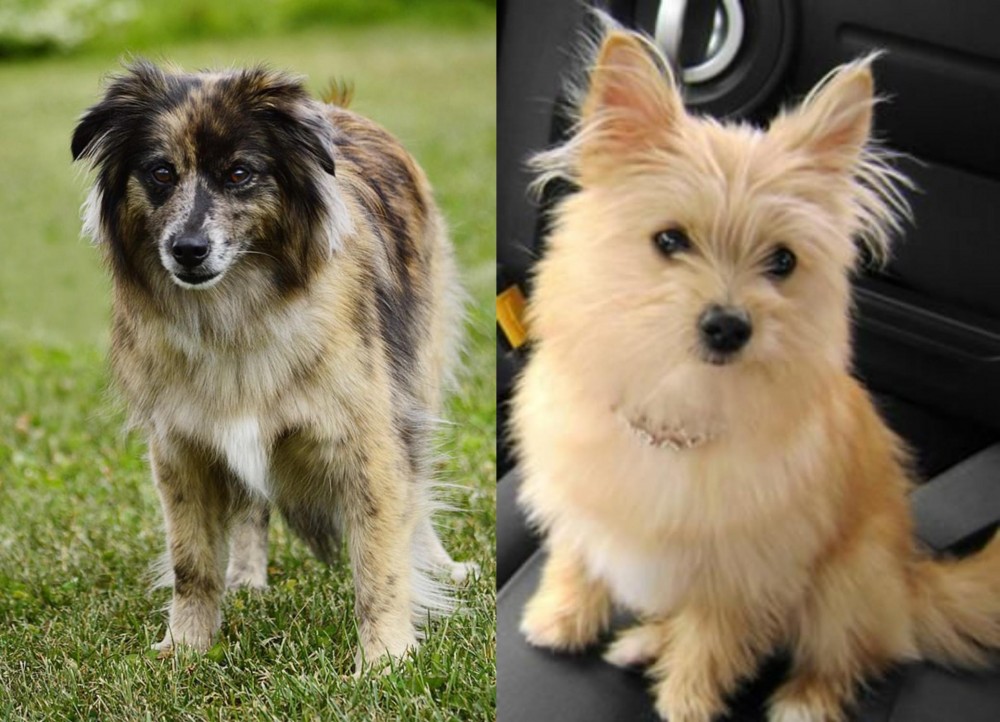 Pyrenean Shepherd is originated from Spain but Yoranian is originated from United States. Pyrenean Shepherd may grow 20 cm / 8 inches higher than Yoranian. Pyrenean Shepherd may weigh 17 kg / 38 pounds more than Yoranian. Both Pyrenean Shepherd and Yoranian has almost same life span. Pyrenean Shepherd may have less litter size than Yoranian. Pyrenean Shepherd requires Moderate Maintenance. But Yoranian requires Low Maintenance
Pyrenean Shepherd is originated from Spain but Yoranian is originated from United States. Pyrenean Shepherd may grow 20 cm / 8 inches higher than Yoranian. Pyrenean Shepherd may weigh 17 kg / 38 pounds more than Yoranian. Both Pyrenean Shepherd and Yoranian has almost same life span. Pyrenean Shepherd may have less litter size than Yoranian. Pyrenean Shepherd requires Moderate Maintenance. But Yoranian requires Low Maintenance
Basic Information
Group:
Herding dogs
Toy dog
undefined
Spain
United States
Life Span:
10 - 15 Years
12 - 14 Years
Other Names:
Pyr Shep
Yorky Pom • Yorkie Pom • Yorkie-Pom • Yorki-pom • Yorkipom • Yoranian Terrier • Porkie • Pom-Yorkie
Colors Available:
grey, black overlay occasionally, Fawn, some white - solid colors or tri-colored
crcream to apricot
Coat:
Long or short haired - soft or wiry
thin Thick, short/medium, shiny, wirehaired double coat
Shedding:
Moderate
Moderate
Temperament:
Affectionate, Alert, Cheerful, Courageous, Curious, Docile, Energetic, Friendly, Gentle, Independent, Intelligent, Lively, Loving, Loyal, Outgoing, Playful, Protective, Quiet, Responsive, Social, Stubborn, Sweet, Territorial
Curious, Energetic, Intelligent, Loving
Grooming:
Moderate Maintenance
Low Maintenance
New Owners Friendly:
Yes
Yes
History
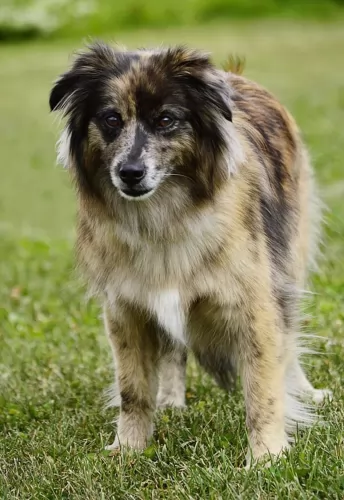 The Pyrenean Shepherd hails from Spain where he has always been used to herd sheep. Some people believe he is a descendant of the French Catalan Sheepdog while others say from the Briard. Nobody is too sure.
The Pyrenean Shepherd hails from Spain where he has always been used to herd sheep. Some people believe he is a descendant of the French Catalan Sheepdog while others say from the Briard. Nobody is too sure.
He is actually the smallest of the French herding breeds. It is interesting to note that he still does this herding job today. It was in the 19th century that a few of these dogs left for America with shepherds who found work herding flocks in the American West.
These dogs were also used in World War 1 as messenger dogs.
It was during the 1970's and 1980's that breeding programs were started for the dog and The Pyrenean Shepherd Club of America was formed in 1987. The dog was also recognized in 2009 by the American Kennel Club.
The Yoranian is a mixed breed, hybrid or “designer” breed. They are a cross between the Pomeranian and the Yorkshire Terrier and are very small dogs. They were developed in Yorkshire, England in the 19th century. It is a very playful, family dog that is not registered with any pure breed club such as the American Kennel Club or AKC.
Description
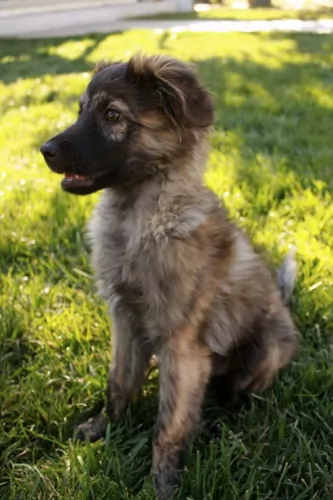 The Pyrenean Shepherd is a medium-sized dog standing at between 38 and 50cm in height and weighing between 14 and 20kg.
The Pyrenean Shepherd is a medium-sized dog standing at between 38 and 50cm in height and weighing between 14 and 20kg.
His head is fairly small with large, bright, expressive eyes. The ears are semi-erect. The tail has always traditionally been docked but often left long these days.
He comes with two different coat types – rough and smooth with sometimes both types being in the same litter. The dog is a regular shedder. The coat can be medium length or long and slightly wavy with a harsh texture. The coat can be of the shorter type with finer, softer hair. The coat is available in different colors and patterns, and can be a fawn color or grey and you will find a black overlay occasionally with some white. The coat can be tri-colored or he can be in solid colors such as cream or white.
Temperament:
Your feisty Pyrenean Shepherd is a dog with plenty of personality. He is also full of energy and will love to live with a outdoorsy-type family who are always on the go, because he’s in on everything.
He is distrustful of strangers and this together with the fact that he is so alert, makes him a splendid watchdog too.
He will need to be trained and socialized as he can be overly robust. He becomes obedient and well mannered, being totally dedicated to his owner. It isn’t easy for him to be separated from his beloved human owner.
The Yoranian is a toy breed, as are both its founding breeds. It checks in at only 7 pounds and stands only 6-10 inches tall. It can have medium or long fur in any combination of the parent’s colors including tan, black, blue or white. They have small ears that stand upright and erect, a small muzzle, medium tail and large round eyes. They can be long and slender like the Yorkshire Terrier or barrel shaped like the Pomeranian.
Characteristics
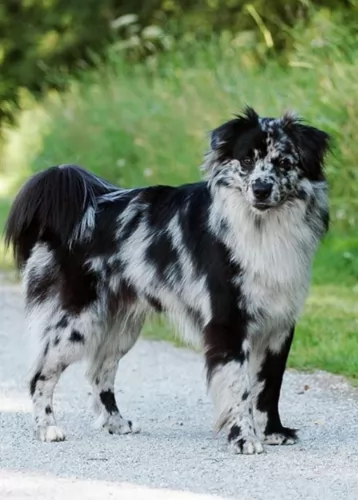 The Pyrenean Shepherd is essentially a one-person dog, becoming totally attached to one particular person in the family.
The Pyrenean Shepherd is essentially a one-person dog, becoming totally attached to one particular person in the family.
He is known as a dog who becomes totally loyal to his human family, getting on well with children as well as with other pets in the home.
He is aloof and wary of strangers. Training and socialization is important so as to avoid aggression and fear. This is one dog that requires being diligently exercised every day.
He is a great watchdog, and when you add up all his fantastic qualities, you get to realize what a splendid companion and pet this wonderful dog makes.
1.Children friendliness absolutely but monitor so that the dog does not get hurt. They are fragile.
2.Special talents – high energy and lots of enthusiasm
3.Adaptability – very adaptable small apartments are great.
4.Learning ability very high gets bored easily
Health Problems
 The Pyrenean Shepherd is such a jovial little dog that you just can’t imagine him ever being sick. When he is lethargic, you'll know there is something seriously wrong with him because he is always as bright as a button.
The Pyrenean Shepherd is such a jovial little dog that you just can’t imagine him ever being sick. When he is lethargic, you'll know there is something seriously wrong with him because he is always as bright as a button.
He can however get sick, and there are a few dog illnesses such as epilepsy, eye problems and hip dysplasia that can be very painful ad debilitating for such an energetic dog. You don’t have to be too concerned though, as he is a dog known to have minimal health issues.
The Yoranian has some medical challenges such as:
• A very fragile neck and back. They can be hurt easily.
• Low Blood Sugar must be monitored.
• Eye irritations and dry eyes without enough tear production.
• Dental issues with decay and loss of teeth.
• Patellar Luxation of slipped kneecaps causing lameness.
• Retinal Atrophy can lead to blindness.
Caring The Pet
Grooming:
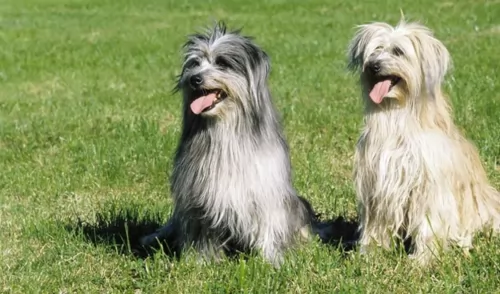 This will depend on the coat type. Both coat types will essentially require you brushing him twice a week.
This will depend on the coat type. Both coat types will essentially require you brushing him twice a week.
Exercise:
The Pyr Shep’s activity levels are very high and this dog will require living with people who love outdoor activities. He’s the perfect companion for those camping trips or hikes. He is always ready to join you on your walks and will be ready and waiting to jump right in when he sees you with a ball or frisbee.
Diet:
For all that energy, your Pyrenean Shepherd will be needing the best dog food there is. Food full of preservatives and colorants can be bad for your pet, detrimental to his health.
Good food full of vitamins and minerals will ensure your pet stands a good chance of living a long, healthy life. If you feed him commercially manufactured dog food, ensure its the best there is, with labeling on the packaging that tells you its for his age, his size and energy levels.
Consistency and simplicity is what your Pyrenean Shepherd wants, and home-made food can enhance his dry kibble. Boiled chicken, brown rice or pasta and spinach, sweet potatoes and carrots all chopped up and mixed into the dry kibble once or twice a week will ensure your pet’s eyes are continuously bright and alert and his tail constantly wagging.
Some raw meat added in occasionally will also go towards ensuring his good health. Always make sure he has access to fresh, cool water.
1 Feeding the puppy don’t overfeed and feed small pieces of toy dog food. 3-4 x per day ¼ cup daily
2.Feeding the adult don’t overfeed/ high quality adult toy dog food. Make sure pieces are small. ¼ to ½ cup daily
3.Points for Good Health – lots of energy and enthusiasm
4. Games and Exercises high energy and enthusiasm at least 2 walks a day.
loves to play inside
Comparison with other breeds
- Yoranian vs English Bulldog - Breed Comparison
- Yoranian vs German Shepherd - Breed Comparison
- Yoranian vs Golden Retriever - Breed Comparison
- Yoranian vs Labrador Retriever - Breed Comparison
- Yoranian vs West Highland White Terrier - Breed Comparison
- Yoranian vs French Bulldog - Breed Comparison
- Yoranian vs Beagle - Breed Comparison
- Yoranian vs Yorkshire Terrier - Breed Comparison
- Yoranian vs Poodle - Breed Comparison
- Yoranian vs Rottweiler - Breed Comparison
- Yoranian vs Boxer - Breed Comparison
- Yoranian vs English Pointer - Breed Comparison
- Yoranian vs Siberian Husky - Breed Comparison
- Yoranian vs Doberman Pinscher - Breed Comparison
- Yoranian vs American Bully - Breed Comparison
- Yoranian vs Abruzzenhund - Breed Comparison
- Yoranian vs Affenpinscher - Breed Comparison
- Yoranian vs Afghan Hound - Breed Comparison
- Yoranian vs Aidi - Breed Comparison
- Yoranian vs Airedale Terrier - Breed Comparison
- Yoranian vs Akbash Dog - Breed Comparison
- Yoranian vs Akita - Breed Comparison
- Yoranian vs Africanis - Breed Comparison
- Yoranian vs Askal - Breed Comparison
- Yoranian vs Atlas Terrier - Breed Comparison
- Pyrenean Shepherd vs English Bulldog - Breed Comparison
- Pyrenean Shepherd vs German Shepherd - Breed Comparison
- Pyrenean Shepherd vs Golden Retriever - Breed Comparison
- Pyrenean Shepherd vs Labrador Retriever - Breed Comparison
- Pyrenean Shepherd vs West Highland White Terrier - Breed Comparison
- Pyrenean Shepherd vs French Bulldog - Breed Comparison
- Pyrenean Shepherd vs Beagle - Breed Comparison
- Pyrenean Shepherd vs Yorkshire Terrier - Breed Comparison
- Pyrenean Shepherd vs Poodle - Breed Comparison
- Pyrenean Shepherd vs Rottweiler - Breed Comparison
- Pyrenean Shepherd vs Boxer - Breed Comparison
- Pyrenean Shepherd vs English Pointer - Breed Comparison
- Pyrenean Shepherd vs Siberian Husky - Breed Comparison
- Pyrenean Shepherd vs Doberman Pinscher - Breed Comparison
- Pyrenean Shepherd vs American Bully - Breed Comparison
- Pyrenean Shepherd vs Abruzzenhund - Breed Comparison
- Pyrenean Shepherd vs Affenpinscher - Breed Comparison
- Pyrenean Shepherd vs Afghan Hound - Breed Comparison
- Pyrenean Shepherd vs Aidi - Breed Comparison
- Pyrenean Shepherd vs Airedale Terrier - Breed Comparison
- Pyrenean Shepherd vs Akbash Dog - Breed Comparison
- Pyrenean Shepherd vs Akita - Breed Comparison
- Pyrenean Shepherd vs Africanis - Breed Comparison
- Pyrenean Shepherd vs Askal - Breed Comparison
- Pyrenean Shepherd vs Atlas Terrier - Breed Comparison
 Petzlover
Petzlover Pyrenean Shepherd is originated from Spain but Yoranian is originated from United States. Pyrenean Shepherd may grow 20 cm / 8 inches higher than Yoranian. Pyrenean Shepherd may weigh 17 kg / 38 pounds more than Yoranian. Both Pyrenean Shepherd and Yoranian has almost same life span. Pyrenean Shepherd may have less litter size than Yoranian. Pyrenean Shepherd requires Moderate Maintenance. But Yoranian requires Low Maintenance
Pyrenean Shepherd is originated from Spain but Yoranian is originated from United States. Pyrenean Shepherd may grow 20 cm / 8 inches higher than Yoranian. Pyrenean Shepherd may weigh 17 kg / 38 pounds more than Yoranian. Both Pyrenean Shepherd and Yoranian has almost same life span. Pyrenean Shepherd may have less litter size than Yoranian. Pyrenean Shepherd requires Moderate Maintenance. But Yoranian requires Low Maintenance The Pyrenean Shepherd hails from Spain where he has always been used to herd sheep. Some people believe he is a descendant of the French Catalan Sheepdog while others say from the Briard. Nobody is too sure.
The Pyrenean Shepherd hails from Spain where he has always been used to herd sheep. Some people believe he is a descendant of the French Catalan Sheepdog while others say from the Briard. Nobody is too sure. The Pyrenean Shepherd is a medium-sized dog standing at between 38 and 50cm in height and weighing between 14 and 20kg.
The Pyrenean Shepherd is a medium-sized dog standing at between 38 and 50cm in height and weighing between 14 and 20kg. The Pyrenean Shepherd is essentially a one-person dog, becoming totally attached to one particular person in the family.
The Pyrenean Shepherd is essentially a one-person dog, becoming totally attached to one particular person in the family. The Pyrenean Shepherd is such a jovial little dog that you just can’t imagine him ever being sick. When he is lethargic, you'll know there is something seriously wrong with him because he is always as bright as a button.
The Pyrenean Shepherd is such a jovial little dog that you just can’t imagine him ever being sick. When he is lethargic, you'll know there is something seriously wrong with him because he is always as bright as a button. This will depend on the coat type. Both coat types will essentially require you brushing him twice a week.
This will depend on the coat type. Both coat types will essentially require you brushing him twice a week.